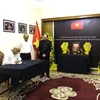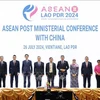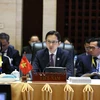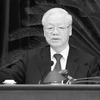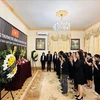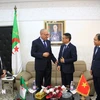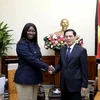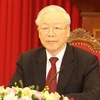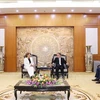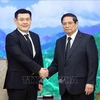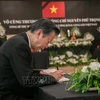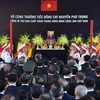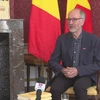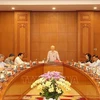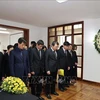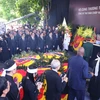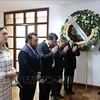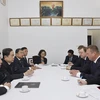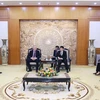The United Kingdom (UK) wants the strategic partnership with Vietnam not to be a peak, but a foundation for building something much greater.
Ambassador Antony Stokes stressed the point in an exclusive interview with the Vietnam Government Portal's reporter on the occasion of the 40th anniversary of diplomatic ties between Vietnam and the UK.
Following is the full text of the interview.
What is your assessment of the UK – Vietnam relations over the past 40 years and especially after the two countries signed the Strategic Partnership Agreement in 2010?
Ambassador Antony Stokes: Today, our relations are stronger than they have ever been.
The Strategic Partnership Agreement reflects a new approach to the relationship between our two governments. Our large-scale aid programme will end in 2016, and in its place we are building a broader, deeper partnership. Education, business, diplomacy, science and innovation, security and defence are all important parts of this.
For example, we have begun to engage on public finance management, and have become the first European country to sign an agreement in this area with the Finance Ministry. We have started projects on science, such as a rice genome project with the Ministry of Science and Technology. We are now also engaging on defence, and signed a first agreement with the Defence Ministry.
This is ambitious, particularly so at a difficult economic period. But we want the Strategic Partnership not to be a peak, but to be a foundation for building something much greater. William Hague confirmed this approach when, last year, he became the first UK Foreign Secretary [Foreign Minister] to visit Vietnam since 1994, signaling our new commitment.
What is the potential for further development of the bilateral relations?
Ambassador Antony Stokes: Foreign Secretary described Vietnam’s potential as “colossal”, and the same can be said for the potential of our bilateral relations. You can see this from the expansion of our agenda into new areas. But we are also determined to accelerate our existing cooperation.
For example, the trade in goods and services between us is a long way below its potential. The Strategic Partnership Agreement sets a target of doubling trade to 4 billion USD and UK direct investment into Vietnam to 3 billion USD by 2013. We passed these targets about a year ahead of schedule. We should go much further.
Our Minister for Trade and Investment, Lord Stephen Green, here in Vietnam in June, told Prime Minister Nguyen Tan Dung that UK companies are keen to work with the Vietnamese authorities and industry on large-scale projects, such as the new urban railway system, the Central Business District and an international hub airport in Ho Chi Minh City.
Prime Minister Dung expressed Vietnam’s interest in learning from the spectacular London 2012 Olympic and Paralympic Games, as Hanoi prepares to host the Asian Games in 2019. So we are working on an agreement to share our skills and experience.
Another good example is education: a core area of the strategic partnership. World-leading British education can help Vietnam meet the challenges it faces. One way is through the establishment of a new type of University, in Da Nang. This joint government initiative aims to create an international standard research and teaching facility, through collaboration with British institutions like Aston University and with commercial partners. The British Council is also expanding, including examinations and new English language schools in Hanoi and Ho Chi Minh City.
We also want closer and bolder dialogue between the two governments to drive this broad agenda. This includes more high-level visits as well as a formal Strategic Dialogue. Vice Foreign Minister Bui Thanh Son will be in London in October to take that forward.
The UK is one of the international donors to Vietnam. What is the British Government’s plan of providing ODA to Vietnam in the coming years?
Ambassador Antony Stokes: You must be proud of Vietnam’s success in pulling so many millions of people out of poverty.
In a modest way, Britain is also proud to have played a minor supporting role. We were Europe’s largest donor and our focus has been to help Vietnam achieve the Millennium Development Goals, such as primary education, HIV/AIDS prevention, rural water and sanitation improvement, and rural transport. We do not tie our aid to commercial benefits.
Recently, as Vietnam has become more prosperous, we have shifted our support towards initiatives which help tackle climate change, enhance job creation through the private sector, and deliver improved governance, particularly assisting the Government’s fight against corruption, on which we are the lead donor. We have also widened our partnership, working with not only the Government but also the National Assembly, the private sector, and the civil society.
We aim to continue building a partnership across these areas beyond 2016, through the British Embassy. In addition, we will continue to provide funding for example through NGOs and global funds focusing on climate change or mine clearance.
What are the highlights of the programme to celebrate the 40th anniversary of UK –Vietnam diplomatic relations in 2013?
Ambassador Antony Stokes: The programme had a remarkable beginning. Nguyen Phu Trong’s visit to London in January was the first by a General Secretary of the Communist Party at the invitation of our Prime Minister David Cameron.
This was followed by a visit to Vietnam by British Minister of Defence Lord Astor. In November we will appoint Britain’s first resident Defence attaché to Vietnam. We will mark this new defence relationship with a visit in December by the Royal Navy ship HMS Daring to Ho Chi Minh City, drawing the year’s programme to a dramatic end
The programme of celebration also includes music, design, fashion, film and sport.
For example, Vietnamese fashion designer Cong Tri presented a collection during London Fashion Week in February and the Vietnamese Embassy later showcased his work over a week at the Southbank in London in June.
Arsenal made history by being the first English Premier League team to play in Vietnam in July.
And last week we brought another British sport to Hanoi, when I attended the Olympic Legacy International Friendship Rugby match.
Later this month “GREAT week” will highlight creative industries, food, drink and education, and provide a platform for British companies to build solid business relationships with Vietnamese partners.
“GREAT” Week will feature events in Hanoi, Da Nang and Ho Chi Minh City, including a series of cultural activities and exhibitions.
There is a lot going on, and you can read more about all this on the Embassy’s Facebook . I hope you join us in celebrating 40 years of bilateral relations, and a bolder, brighter future.-VNA
Ambassador Antony Stokes stressed the point in an exclusive interview with the Vietnam Government Portal's reporter on the occasion of the 40th anniversary of diplomatic ties between Vietnam and the UK.
Following is the full text of the interview.
What is your assessment of the UK – Vietnam relations over the past 40 years and especially after the two countries signed the Strategic Partnership Agreement in 2010?
Ambassador Antony Stokes: Today, our relations are stronger than they have ever been.
The Strategic Partnership Agreement reflects a new approach to the relationship between our two governments. Our large-scale aid programme will end in 2016, and in its place we are building a broader, deeper partnership. Education, business, diplomacy, science and innovation, security and defence are all important parts of this.
For example, we have begun to engage on public finance management, and have become the first European country to sign an agreement in this area with the Finance Ministry. We have started projects on science, such as a rice genome project with the Ministry of Science and Technology. We are now also engaging on defence, and signed a first agreement with the Defence Ministry.
This is ambitious, particularly so at a difficult economic period. But we want the Strategic Partnership not to be a peak, but to be a foundation for building something much greater. William Hague confirmed this approach when, last year, he became the first UK Foreign Secretary [Foreign Minister] to visit Vietnam since 1994, signaling our new commitment.
What is the potential for further development of the bilateral relations?
Ambassador Antony Stokes: Foreign Secretary described Vietnam’s potential as “colossal”, and the same can be said for the potential of our bilateral relations. You can see this from the expansion of our agenda into new areas. But we are also determined to accelerate our existing cooperation.
For example, the trade in goods and services between us is a long way below its potential. The Strategic Partnership Agreement sets a target of doubling trade to 4 billion USD and UK direct investment into Vietnam to 3 billion USD by 2013. We passed these targets about a year ahead of schedule. We should go much further.
Our Minister for Trade and Investment, Lord Stephen Green, here in Vietnam in June, told Prime Minister Nguyen Tan Dung that UK companies are keen to work with the Vietnamese authorities and industry on large-scale projects, such as the new urban railway system, the Central Business District and an international hub airport in Ho Chi Minh City.
Prime Minister Dung expressed Vietnam’s interest in learning from the spectacular London 2012 Olympic and Paralympic Games, as Hanoi prepares to host the Asian Games in 2019. So we are working on an agreement to share our skills and experience.
Another good example is education: a core area of the strategic partnership. World-leading British education can help Vietnam meet the challenges it faces. One way is through the establishment of a new type of University, in Da Nang. This joint government initiative aims to create an international standard research and teaching facility, through collaboration with British institutions like Aston University and with commercial partners. The British Council is also expanding, including examinations and new English language schools in Hanoi and Ho Chi Minh City.
We also want closer and bolder dialogue between the two governments to drive this broad agenda. This includes more high-level visits as well as a formal Strategic Dialogue. Vice Foreign Minister Bui Thanh Son will be in London in October to take that forward.
The UK is one of the international donors to Vietnam. What is the British Government’s plan of providing ODA to Vietnam in the coming years?
Ambassador Antony Stokes: You must be proud of Vietnam’s success in pulling so many millions of people out of poverty.
In a modest way, Britain is also proud to have played a minor supporting role. We were Europe’s largest donor and our focus has been to help Vietnam achieve the Millennium Development Goals, such as primary education, HIV/AIDS prevention, rural water and sanitation improvement, and rural transport. We do not tie our aid to commercial benefits.
Recently, as Vietnam has become more prosperous, we have shifted our support towards initiatives which help tackle climate change, enhance job creation through the private sector, and deliver improved governance, particularly assisting the Government’s fight against corruption, on which we are the lead donor. We have also widened our partnership, working with not only the Government but also the National Assembly, the private sector, and the civil society.
We aim to continue building a partnership across these areas beyond 2016, through the British Embassy. In addition, we will continue to provide funding for example through NGOs and global funds focusing on climate change or mine clearance.
What are the highlights of the programme to celebrate the 40th anniversary of UK –Vietnam diplomatic relations in 2013?
Ambassador Antony Stokes: The programme had a remarkable beginning. Nguyen Phu Trong’s visit to London in January was the first by a General Secretary of the Communist Party at the invitation of our Prime Minister David Cameron.
This was followed by a visit to Vietnam by British Minister of Defence Lord Astor. In November we will appoint Britain’s first resident Defence attaché to Vietnam. We will mark this new defence relationship with a visit in December by the Royal Navy ship HMS Daring to Ho Chi Minh City, drawing the year’s programme to a dramatic end
The programme of celebration also includes music, design, fashion, film and sport.
For example, Vietnamese fashion designer Cong Tri presented a collection during London Fashion Week in February and the Vietnamese Embassy later showcased his work over a week at the Southbank in London in June.
Arsenal made history by being the first English Premier League team to play in Vietnam in July.
And last week we brought another British sport to Hanoi, when I attended the Olympic Legacy International Friendship Rugby match.
Later this month “GREAT week” will highlight creative industries, food, drink and education, and provide a platform for British companies to build solid business relationships with Vietnamese partners.
“GREAT” Week will feature events in Hanoi, Da Nang and Ho Chi Minh City, including a series of cultural activities and exhibitions.
There is a lot going on, and you can read more about all this on the Embassy’s Facebook . I hope you join us in celebrating 40 years of bilateral relations, and a bolder, brighter future.-VNA
